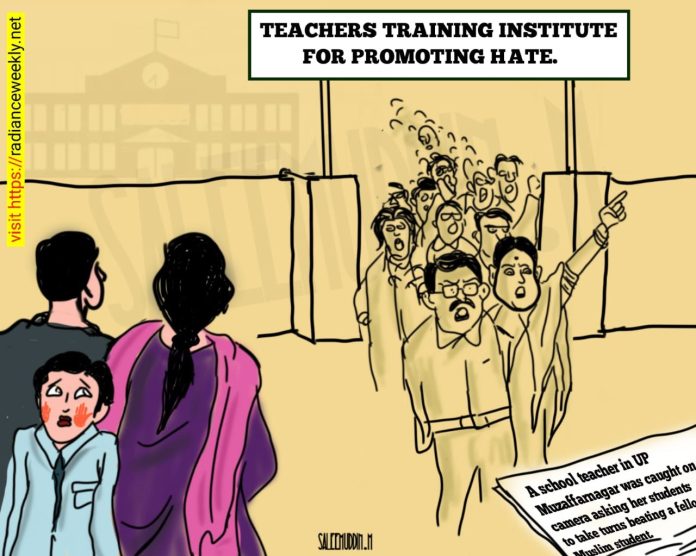In our ever-evolving society, teachers play a pivotal role in shaping the future. They possess the unique capacity to nurture not only intellect but also character. However, within the hallowed halls of our educational institutions, a disquieting reality often remains unspoken: racism can permeate the very heart of the teaching profession. This column delves into the roots of racism among educators, its far-reaching implications, and the vital search for remedies. Join us in exploring this pressing issue, as we seek to dismantle these barriers within education and foster a more inclusive and equitable future.
— SYED AHMED ALI

As we celebrate the Teachers’ Day, recent incidents in our educational institutions have garnered global attention, shedding light on the pervasive political and ideological influence within our educational system. When teachers step into the classroom, their primary duty is to nurture the future of their students.
Teachers hold a profound influence over their students. Messages of discrimination and racism, if conveyed by educators, can be ingrained in the minds of the younger generation. These harmful beliefs may persist, manifesting in students’ behaviours not only in the classroom but also at home, in their communities, and later at their workplaces.
The consequences extend beyond the immediate environment. When these students grow into adults, taking on roles as business owners, politicians, or administrators, they may perpetuate these discriminatory attitudes in their decision-making processes, ultimately affecting the entire nation.
To address this issue, we must acknowledge its existence and take concrete steps toward remedies. This includes comprehensive teacher training programmes that emphasise inclusivity, diversity, and anti-discrimination education. Schools should foster a culture of respect, where students are taught not only academic subjects but also the values of tolerance and equality. By doing so, we can aspire to create a future where racism among teachers becomes a relic of the past, and our educational institutions stand as beacons of enlightenment.
While responsible teachers, driven by the aim of nurturing responsible citizens, are less likely to engage in discriminatory practices, there remains a substantial gap between classroom teachings and societal practices. Teachers are increasingly influenced by society, politicians, and political rhetoric, impacting their attitudes. Religious leaders should refrain from spreading hate, as their actions can influence teachers. Moreover, there’s a significant deficit in teaching students social skills, emotional intelligence, and empathy, which are essential aspects of their holistic development.

When we examine racism and discrimination in Indian schools, we encounter a history that stretches back to the pre-Independence era. Even a cursory look at the past few centuries reveals that Dalits, Adivasis, and individuals from backward communities bore the brunt of racial bias. This dark chapter remains etched in our collective memory as a stark reminder of our nation’s struggle against prejudice.
With Independence came the hope of a more inclusive society, underpinned by a Constitution aimed at dismantling entrenched racism and discrimination in educational institutions. However, the issue persists today.
Recent tragic incidents, such as Rohit Vemula’s death at HCU, underscore that our battle against discrimination is far from over. Muslims have become increasingly vulnerable to these injustices, fuelled by the spread of Islamophobia via the media, educational institutions, and historical distortions.
Addressing this issue requires a multi-pronged approach:
Legal Action: Encourage the reporting of such incidents, often silenced by innocent students. This data can support legal action and push for anti-discrimination legislation.
Political Cooperation: Muslim leaders must collaborate with secular parties to halt the saffronisation of education.
Social Engagement: Foster dialogue with other communities for peaceful coexistence, dispelling misunderstandings about Islam. Collaborate with stakeholders upholding a plural, just India.
Moreover, the new education policy threatens India’s plural fabric. State-level education policies may help prevent discrimination resulting from central policies.

In a world where time urges our minds to hasten, we contemplate effective strategies to combat racism within the realm of education. Our focus is on addressing the deeply ingrained discriminatory practices and unfounded beliefs in biological and cultural superiority that have endured for centuries in our racialised society. To counter this, we propose a holistic approach.
First and foremost, education must become a powerful tool for eradicating injustice and unfair categorisations within the human race. This process should commence early, nurturing a belief in global human equality among young minds. Simultaneously, we must instil respect for all ethnicities through both teaching and real-life applications. Encouraging values like sharing, caring, and active inclusion within classrooms is imperative.
Government bodies and private institutions must join forces to develop inclusive curricula, emphasising values such as empathy. The presence of counsellors is essential to address and mitigate conflicts if they arise. Creating inclusive groups or clubs can also foster an environment of diversity. The power of storytelling, especially through large-scale superhero narratives, can be harnessed to educate and address injustices against various communities or races.
Furthermore, teachers, as mentors, must lead by example, exemplifying inclusivity and equality in their actions. Lastly, the responsibility extends to society’s intellectuals, religious leaders, families, and grandparents, all of whom play a vital role in educating, and taking a stand against discrimination.
These integrated measures aim to contribute to the establishment of a more inclusive and equitable educational landscape, one that upholds the dignity and respect of every individual, regardless of their race or ethnicity.



